Thixotropic clay | Modified Bentonite
Whatsapp/Wechat :+86-13185071071
- 20+ Years Experiences
- Strong R & D Team
- ISO Certification & Patents
- Own Raw Bentonite Ore
- Cooperation Experience of the Top 5 Enterprises in the Industry
Thixotropic clay Agent
Thixotropic clay are a common additive that is mainly used in various chemical formulations to achieve thixotropic properties.
For example, there are high requirements for thixotropy in oilfield drilling, paint, coating and lubricant formulations. Therefore, when you use Camp Shinning’s modified organic bentonite clay to improve your thixotropic performance, it will give you a satisfactory result.
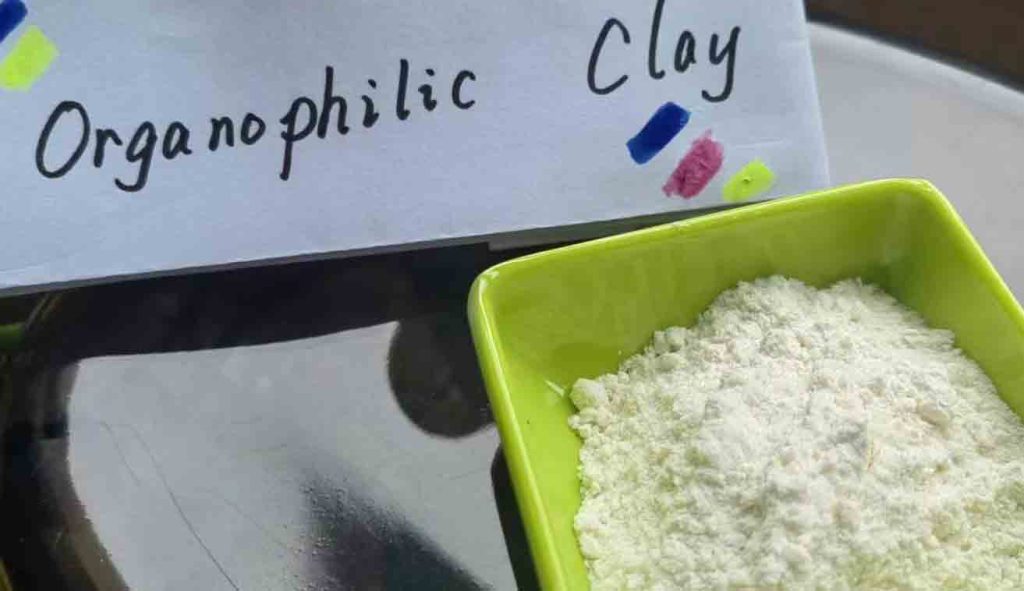
Email: [email protected] Whatsapp : +86-13185071071
Thixotropic clay
Drilling Grade Organoclay
Our cp series of Thixotropic clay is mainly used to help you achieve better anti settling and thixotropy properties when it is applied to paint coatings. Of course, its anti sagging performance is also its greatest advantage. Therefore, rheological properties are all goals that can help you achieve in this product.
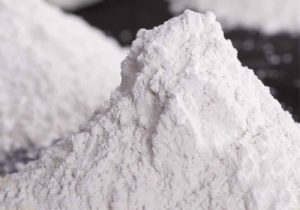
CP-992 Organophilic clay
CP-992 Organophilic Clay, the wet process improved viscosifier and gelling agent . It is a rapidly dispersing.

CP-982 Organophilic clay
CP-982 Organophilic Clay is an amine treated bentonite with a moderate temperature performance.

CP-150 Organophilic Clay
CP-150 Organophilic Clay is a self-activating organoclay that disperses easily and performs well in diesel, low aromatic mineral oil, modified vegetable oil, and synthetic base fluid formulations.
Thixotropic clay
Thixotropic clay : We also call it organoclay bentonite, or there are many names, but in general, it mainly plays a role in the presentation of thixotropic properties and the emergence of anti settling properties. Whether you apply it to paint, ink, grease, or even oilfield drilling, when people produce organic bentoni


CP-10 Organoclay
CP-10 organoclay is a rheological additive made of organoclay. It is used in non-polar to moderately polar aliphatic and other solvent systems

CP-MPZ organoclay
CP-MPZ organoclays is an modified bentonite that is used in solvent and resin systems ranging from non-polar to highly polar.

CP-MPS Organoclay
The CP-MPS rheology modifier is a type of organo clay rheological additive that is used in solvent and resin systems ranging from non-polar to high polarity.
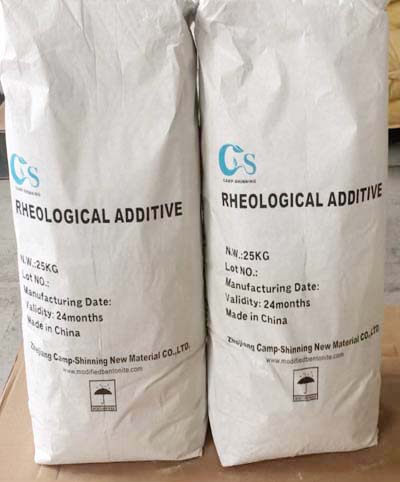
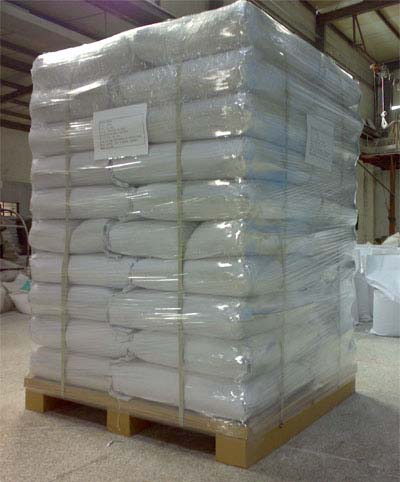
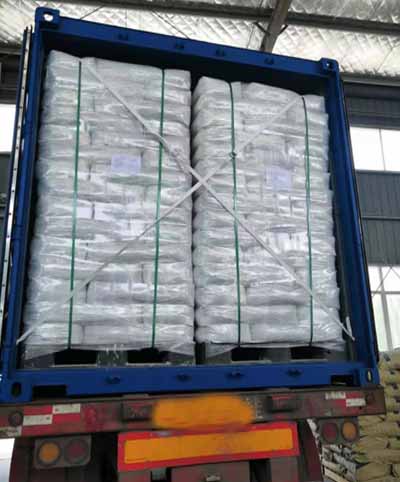
Organoclay Supplier / Manufacturer :
Internet address: https://www.rheologymodifiers.com/
Email address: [email protected]
Whatsapp / Wechat: +86-13185071071
Organophilic Clay Supplier / Manufacturer :
Organoclay For Water Based Coatings

CP-EW organoclay for water based paint
CP-EW Organoclay for Water Based paint. It is primarily employed in water borne paint systems,such as latex paint. So it is a good water based additive in paints,coatings,grease etc.

CP-EWS Organoclay
CP-EWS Modified bentonite It is employed in a water-borne coatings system. CP-EWS organoclay outperforms CP-EW in terms of thixotropy, transparence, and dispersion.

CP-WBS Rheology modifier
CP-WBS Rheology Modifier is rheological modified bentonite. It is mostly employed in water-borne systems.


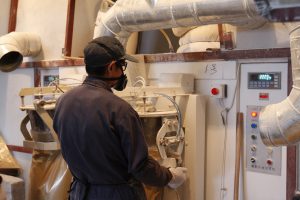
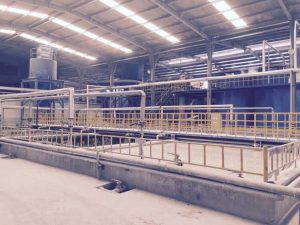

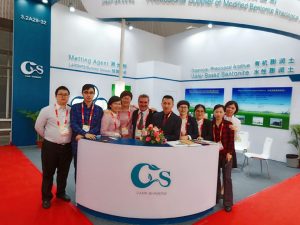
The Organoclay bentonite | Organophilic clay -specialized Zhejiang Camp-Shinning New Material CO.,LTD. and Hangzhou Camp-Shinning CO.,LTD. are subsidiaries of Camp-Shinning.
Camp-shinning concentrated on high value-added, high-technology organo bentonite series products, particularly in research, development, manufacturing, and sales of organic (solvent based organoclay) and inorganic bentonite (water based organoclay).
Our Organophilic bentonite clay finds widespread application in oil drilling mud, paint, coating, lubricating grease, adhesive, construction mortar, cosmetics, and waste water treatment, among other applications. A group of world-class professional users and distributors, such as SUN CHEMICAL,,SIEGWERK,LEHMANN &VOsS, and others, have acknowledged our dependable quality.
Current annual production of organic bentonite clay | organoclay is 20,000 metric tons, while refined bentonite production is 15,000 metric tons.
Our ISO 9001 quality system certification and IS014001 environmental management system certification, as well as our own mine with superior ore quality and production of proprietary technology, ensure the long-term quality and supply stability of our Organoclay bentonite | Organophilic clay.
Our mission is to provide users with superior Organoclay bentonite | Organophilic clay and services and to collaborate with them to achieve success and glory.
Internet address: https://www.rheologymodifiers.com/ and email address: [email protected]
Whatsapp / Wechat: +86-13185071071
Organoclay | Organophilic Clay CP-2 also named amine treated Bentonite.
In diesel oil based fluids,organophilic clay viscosifier CP-2 are used to increase carrying capacity and suspension properties, providing support for weight materials and improved cutting removal. Organophilic bentonite also aids in filter-cake formation and filtration control.
Properties
Composition Organically modified bentonite clay
Physical appearance Off white to tan free-flowing powder
Moisture content (105℃,2hr) ≤4%
Particle size (<76μm or 200mesh) ≥95%
Specific Gravity 1.6-1.8
Advantages
Effective viscosifier and gellant
Aids control of fluid loss to the formation
Increases emulsion stability
Improves cuttings carrying and hole cleaning capacity
Suspends weighting materials and other solids
Confers temperature stability to the fluid
Application
Base oil:
Diesel Oils
Crude Oils
Mineral Oils
Synthetic Oil
Viscosifying drilling Fluids:
Oil based drilling fluids
Invert emulsion fluids
Workover fluids
Completion fluids
Casing packs
Packer fluids
Spotting fluids
Package
Organoclay | Organophilic Clay CP-2 is packed in 50lb(22.7kg) or 25kg/bag or customized,multi-wall paper sacks or Kraft paper bag with PE liner or customized.
Storage
CP-2 Store in a dry, well-ventilated area with temperature of 0℃-30℃. Keep container closed. The quality guarantee period is 24 months.
Notice
The information on use is based on data which are believed reliable, but any recommendation or suggestion made is without guarantee or warranty, since the conditions of use are outside our control. All products are sold on the conditions that purchasers shall make their own tests to determine the suitability of such products for their purpose and that all risks are assumed by user. We disclaim any responsibility for damages resulting from careless or improper handling or use. Nothing herein is to be taken as permission, inducement or recommendation to practice any patented invention without a license.
Internet address: https://www.rheologicaladditive.com/ and email address: [email protected]
Whatsapp / Wechat: +86-13185071071
Thixotropic Organoclay Clay
Organoclay is a thixotropic clay substance with the ability to thicken extremely viscous solutions. Clay’s effectiveness as a thixotropic agent is determined on the coarseness of the clay particles. As a thickening agent, this material does not require partial or total drying.
Dispersion of thixotropic organoclay clay | Thixotropic clay:
In many applications, dispersion of organoclay compounds is a difficulty. The clay content of organoclay compounds determines their characteristics. To promote dispersion, more quantities of the quaternary ammonium component can be added to the mixture.
Organoclay is a good alternative for paint formulations due to its exceptional thixotropic characteristics. It has a high absorption capacity, stabilizes emulsions, and suspends pigments. It is also suited for cement-based petroleum industry activities and landfill liners. In addition, the rheological qualities of organoclay make it an excellent candidate for high-viscosity paints.
The dispersion of organoclay is essential for the formation of thixotropy. Several factors, including as the composition of the aqueous phase, the history of shear, and the composition of the base oils and emulsifiers, influence it.
Organoclay is generated by chemically altering a smectite-type clay with an amino or quaternary ammonium molecule.
Thixotropic clay
Polypropylene melts are a typical medium for dispersing organoclay. Its rheological properties can be improved by adding polar solvents or other solvents. These organic clays have multiple applications, including stripping and enhancing the adhesion of polymeric coatings.
Organoclay thixotropic clay can also be used in viscous environments as a rheological agent. Thus, it is compatible with a vast array of rheological substances. In addition, it is a cost-effective method for producing a thixotropic organoclay material.
Properties
Organoclay is an extremely viscous material that has several applications as a rheological agent. It has high viscosity at low shear rates and great control over fluid films and settling. This clay can be added to a range of viscous compositions and should be used in 0.1% to 10% weight concentrations.
The addition of organophilic clays to drilling muds can increase these substances’ thixotropy. For instance, Organophilic clay CP-992 enhances the thixotropic characteristics of gasoil-based muds and reduces the yield stress of the mud. It has been demonstrated that this clay enhances the viscoelasticity and cohesive forces of drilling muds.
Organoclay’s unique features allow it to dissolve hydrocarbons. Hydrocarbons, like oil, are organic molecules. Because organoclay contains amines introduced during the manufacturing process, these organic compounds are very soluble in it. These amines operate as surfactants and reduce liquid surface tension, allowing previously incompatible substances to be mixed. For example, while oil is insoluble in water, it is soluble in organoclay.
To improve the clay’s thixotropic characteristics, polar organic compounds are combined with it. These substances are commonly known as polar activators, dispersants, and solvating agents. Additionally, they have been introduced directly to organoclay to boost its effectiveness. They have also been employed to thicken the composition.
Organoclay is a chemically modified bentonite that, when combined with an organic solvent, can generate a thixotropic dao gel. It can be used as a latex stabilizer and to avoid inorganic filler precipitation. Due to these characteristics, organoclay is a valuable rheological ingredient in the coatings industry. It is commonly used in paint and petroleum products.
Organoclay can be dried in numerous ways. Preferred is drying the thixotropic clay in a fluidized bed at temperatures between 30 and 100 degrees Celsius. Alternately, the clay can be dried using established drying processes that maintain a temperature below 60 degrees Celsius until it is nearly dry.
Applications
Organoclay thixotropic clays are rheological agents that increase the viscosity of extremely viscous systems. In a variety of applications, organoclay thixotropic compounds are an excellent alternative to polar activators. Clay particles rapidly absorb liquid, preventing them from settling or sagging. Organoclay can be added to viscous compositions in levels ranging from 0.1% to 10% by weight, depending on the application. However, the ideal range is between 0.3% and 5.0%.
They have proven to be useful for increasing the performance of paint and other products in a variety of industries. They can also be used to increase the uniformity of printing inks, allowing for more color coverage and retention. In addition, they do not cause skin or eye irritation. They are also utilized in paints and coatings as thixotropic agents.
Thixotropic clay
Organoclay Supplier / Manufacturer :
Internet address: https://www.rheologymodifiers.com/
Email address: [email protected]
Whatsapp / Wechat: +86-13185071071
Organophilic Clay Supplier / Manufacturer :
Grease Grade Organoclay

CP-180 Organoclay
CP-180 organoclay is an organo clay rheological additive (modified montmorillonite) designed specifically for use in solvent-based systems

CP-34 Organoclay
CP-34 organoclay is a modified bentonite that has been specifically designed for use in solvent-based systems.

CP-EDS ORGANOCLAY
CP-EDS modified bentonite is a kind of organo clay rheological additive. It is used in systems of medium polarity and high polarity system.
Send Inquiry Now
Email: [email protected]
Whatsapp/Wechat: +86-13185071071
Thixotropic clay : We suggest that you test our product to verify whether it can fully meet your thixotropy and rheological requirements for your entire formula, and at the same time, it will give you unexpected anti settling performance.